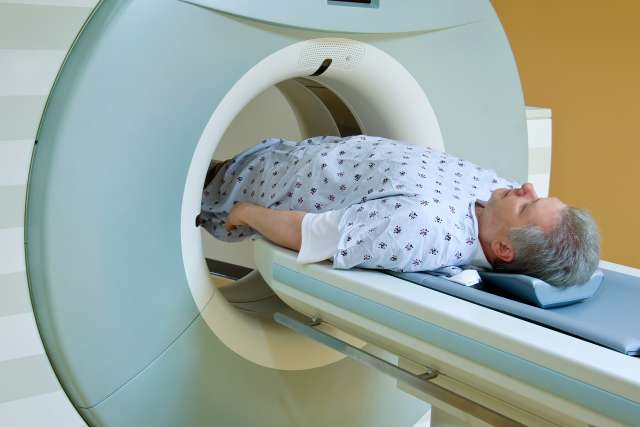Prostate Imaging and Treatment
Our radiologists use advanced, effective imaging techniques to evaluate and diagnose conditions affecting the prostate. We offer comprehensive care with a team-based approach.

UCLA Health approach to prostate imaging and treatment
UCLA Health radiologists offer comprehensive and sophisticated imaging to evaluate and diagnose prostate disease. We work closely with referring health care providers, offering expertise in prostate cancer diagnosis, treatment and follow-up care.
Highlights of our program include:
Advanced techniques: We use leading-edge imaging techniques that allow us to make accurate, timely diagnoses. Specialized imaging services include magnetic resonance (MR) spectroscopy, MR perfusion, MR diffusion, diffusion tensor imaging, MR-ultrasound image fusion for biopsy guidance and direct MR-guided biopsy.
Team-based treatment: Our team is made up of multiple subspecialized experts, including those in genitourinary radiology, medical physics and imaging informatics. We work closely with referring physicians to address specific, individualized concerns.
Research emphasis: The imaging experts at UCLA Health are dedicated to research. We continually study and develop new techniques, offering patients the latest, most effective options.
Prostate conditions we treat
Our prostate imaging team evaluates and diagnoses conditions affecting the prostate, the small walnut-shaped gland that produces seminal fluid. We diagnose and treat:
Benign prostatic hyperplasia (BPH): Age-related enlargement of the prostate gland. As the prostate gets bigger, it may partially block the urethra (the tube that moves urine from the bladder out of the body), causing lower urinary tract symptoms.
Prostate cancer: Cancer that starts in the prostate. It’s the second-leading cause of cancer death in American men.
Tests and procedures we offer
We use a range of advanced tools and tests to assess and treat prostate conditions. Our radiologists may use:
Prostate MRI
This imaging test uses magnets, radio waves and a computer to view inside the body. MRIs show us the size and location of tumors, allowing us to:
- Assess how well treatment is working
- Diagnose and stage cancer
- Follow up on rising PSA levels after prostate removal, which may indicate the cancer has come back
- Monitor for changes in patients with low-grade prostate disease (active surveillance)
- Pinpoint where to obtain tissue samples for biopsies, which evaluate prostate tissue for cancer cells
- Plan treatment, such as surgery or radiation therapy
In some cases, patients may receive an endorectal coil, a thin wire placed in the rectum close to the prostate. This coil can help us view the prostate in more detail. It also allows us to perform MR spectroscopy, which gives us more information about the chemical makeup of prostate cells. The coil is removed after the scan.
We may also use MRI to evaluate the blood flow (MR perfusion) or extent of cellular crowding (MR diffusion). These newer techniques can identify subtle changes to help us better detect and stage prostate cancer. For example, blood flow increases in cancer cells, and cellular crowding is worse where cancer cells are rapidly turning over.
Prostate artery embolization (PAE)
This nonsurgical procedure is performed to improve lower urinary tract symptoms, such as urinary incontinence, caused by BPH. An interventional radiologist guides a catheter to the arteries that supply the prostate gland. Then they inject tiny particles into the arteries to reduce blood supply, shrink the prostate and relieve BPH symptoms.
Transurethral ultrasound ablation (TULSA)
This novel MRI-guided procedure uses ultrasound to effectively treat prostate cancer with minimal side effects. Your physician places a small, rod-shaped device into the urethra. This device has 10 ultrasound-generating elements that can cover the entire prostate gland. A software algorithm tells the elements to send out sound waves that heat and destroy diseased prostate tissue.
The entire procedure takes place in an MRI scanner so your physician can closely monitor the treatment and assess the degree and location of the heating. You can typically return home the same day.
Our expert team
Our radiologists are experts in prostate imaging and treatment. We use the latest, most advanced imaging techniques that offer more accurate, timely diagnoses. Our specialists work closely with referring providers to ensure each patient receives comprehensive care.
Radiologists

Haatal Dave, MD
Acute Care Imaging, Abdominal Imaging
Molecular Imaging / Nuclear Medicine
Urologists
Scientists





Contact us
Call to request an appointment with a prostate imaging and treatment specialist at UCLA Health.
Find your care
Our radiologists lead the way in prostate imaging. We offer the newest techniques to better detect and stage prostate cancer. Call to find out more about prostate imaging and treatment options.













